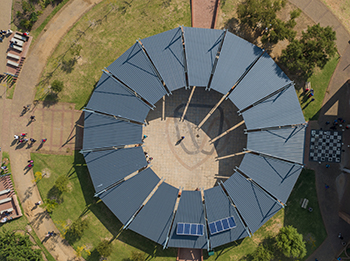Latest News Archive
Please select Category, Year, and then Month to display items
29 August 2024
|
Story Anthony Mthembu
|
Photo Harmse Photography
 Ross van Reenen, CEO of the Toyota Free State Cheetahs.
Ross van Reenen, CEO of the Toyota Free State Cheetahs.
The Business School at the University of the Free State (UFS) recently hosted the CEO of the Toyota Free State Cheetahs, Ross van Reenen, for a guest lecture. Van Reenen presented the guest lecture in the Business School Auditorium on the UFS Bloemfontein Campus on 21 August 2024.
Reflecting on Van Reenen’s address
In a lecture addressed to an auditorium filled with UFS staff and students, Van Reenen’s talk was divided into several sections. Firstly, he spoke about the concept of the ‘black swan’ in reference to the book written by Nassim Nicholas Taleb, titled The Black Swan: The Impact of the Highly Improbable. Referring to Taleb’s book, Van Reenen defined a ‘black swan’ as a rare event that has a severe impact, and the occurrence of which people try to explain. He used some examples to explore this concept as well as its implications, including COVID-19 and its impact on the world, and the tragic death of the people in the Titanic disaster. However, he delved deeper into 9/11 and the extent of its impact, saying that “9/11 was a major wake-up call in the world economy”. Van Reenen highlighted how some companies such as Barclays, for which he previously consulted, had to work to be up and running after the collapse of the Twin Towers in 9/11.
In addition, Van Reenen’s lecture also touched on the importance of the first ninety days of a job after an individual has been employed. “Those first ninety days are crucial, as you have to establish yourself in a company where you are paid less than you are worth,” Van Reenen said. As such, he gave the audience insight into what they could focus on in that time frame. This includes focusing on the small wins, as well as ensuring that you are working at keeping the team together, as the team is an integral part of an organisation.
Van Reenen concluded his address by speaking about his time as the CEO of the Toyota Free State Cheetahs, including some of the decisions he took to ensure the success of the organisation.
Renewable energy systems an economical investment for the UFS
2017-06-14

The Qwaqwa Campus Arena equipped with freestanding
roof solar panels.
Photo: iFlair Photography
Renewable energy systems are said to be very expensive to implement initially, but in the long run they provide high economic returns.
With their decision to install renewable energy, the University of the Free State Department of Facilities Planning has now also adopted this innovative technology. They have chosen less capital-intensive solar power-generating options to generate electricity in various buildings and parking areas on all three UFS campuses.
“As per the UFS Energy Management Policy, all designs incorporate efficient, renewable energy sources varying from LED lights to solar power,” says Anton Calitz, Electrical Engineer in University Estates’ Department of Facilities Management.
South Campus taking the lead in renewable energy usage
In December 2016, a total of 26 solar-driven LED street-light poles were installed at the recently built Legae Residence’s parking area and the perimeter security area on the South Campus. This low-maintenance system improves security after dark and is independent of the national power supply, which is an important advantage during power outages. With no requirements for major earthworks and cable setting, operational costs are reduced.
The recently built infrastructure also takes pride in being the first to have a greywater system installed. This system will also be installed at three other residences on the Bloemfontein Campus in 2017. Greywater is made up of bath, shower, and bathroom sink water. The water is reused for toilet flushing, as well as for irrigation purposes.
Various UFS electrical operations to depend on solar power
On the Bloemfontein and Qwaqwa Campuses, the computer laboratories as well as the Thakaneng Bridge Student Centre and the projected Afromontane Research Centre will be equipped with freestanding roof solar solutions during 2017. These systems are designed to operate independently of the power grid (Eskom).
The systems only operate during sunlight hours when the PV solar panels are heated by the sun, making them suitable for operations such as ventilation fans, water pumps, and small circulation pumps for solar thermal water-heating systems.